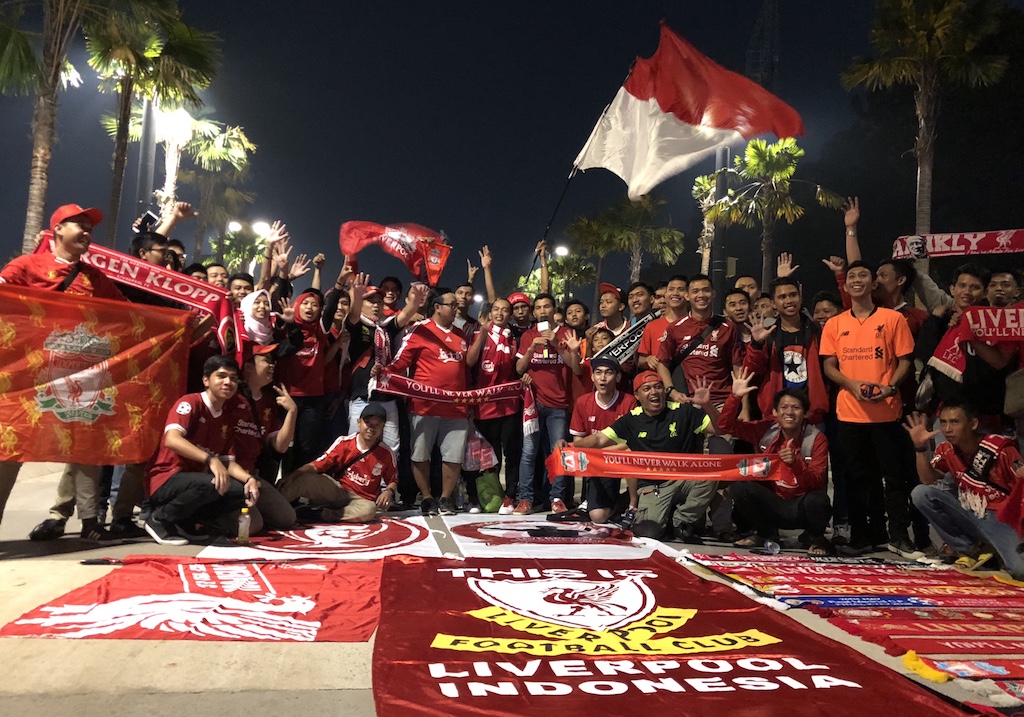It’s May 26 at 9pm, and the west gate of Jakarta’s Gelora Bung Karno (GBK) Stadium — Indonesia’s national stadium — is open for a special occasion.
Some 7,500 miles away in Kiev, Ukraine, a young Liverpool squad are gearing up for the game of their lives. It’s the final of the UEFA Champions League — undoubtedly the most prestigious club competition in world soccer — and not a single one of them have ever won it. Their opponents, the mighty Spanish giants Real Madrid, had won two on the trot, and three in the past four years.
Back in Jakarta, hundreds clad in red start trickling onto the the vast lawn of GBK. Like their heroes in Kiev, there’s a palpable sense of nervousness — even dread — among the Liverpool fans in attendance. The last time Liverpool won the Champions League was in 2005, so for many of the younger fans, this night is a first.
Soccer is the global sport, the beautiful game that transcends borders and cultural barriers. Kids and adults alike around the world wear jerseys of European powerhouses such as Barcelona, Real Madrid, and Juventus with pride, even if they have no geographical connection to the cities where these teams are based.
In Indonesia, Liverpool FC is king.
A study by Nielsen Sports in 2014 estimated that there are 66.1 million Liverpool followers in Indonesia, a quarter of the country’s population and slightly more than the population of the entire UK (65.6 million in 2016). Indonesia’s Liverpool fans can fill the team’s 54,000 capacity home stadium, Anfield, 1,224 times over.
The most hardcore fans form and join numerous fan clubs in the country. BIG Reds, the only official Liverpool fan club in Indonesia, boasts close to 7,000 of the most fanatical paying members in Indonesia across 24 regional chapters. They hold regular community events and gather to watch every single Liverpool match without fail, usually in outdoor screenings or booked out cafés and restaurants. The time difference usually means that they often have to stay up late at least once a week to watch Liverpool play on TV screens.
The fanaticism is rabid, despite the fact that, since the glory years of the ‘80s and ’90s, Liverpool hasn’t won as many trophies as other European giants, including arch rivals Manchester United. And that fanaticism is passed down generation to generation.
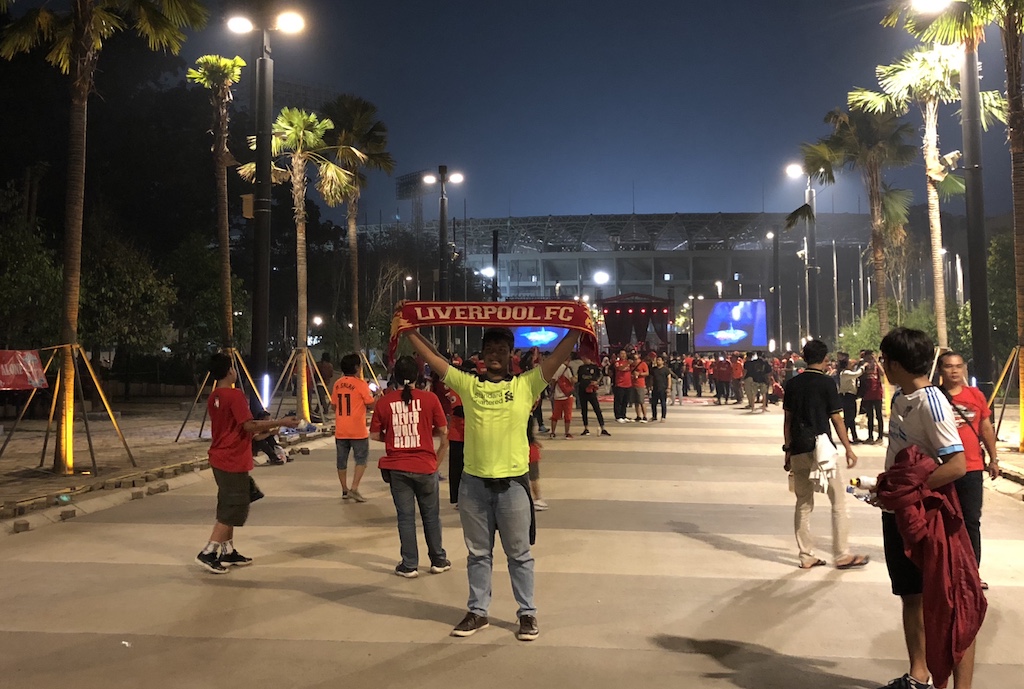
Two of that next generation are a 4-year-old girl and her 2-year-old brother I met outside the stadium on Sunday night. Both came with their father, Evan, and mother, Yuni. Then entire family was clad in Reds jerseys. While little bro didn’t really know what is going on, big sis seems particularly excited by the upcoming match, with Evan explaining that she got hooked as she often stayed up late to watch Liverpool’s Premier League games with him on TV.
“The wife? Not so much. She’s just tagging along,” Evan said. Yet I couldn’t help but notice her jersey was authentic and not a cheap Thai knockoff — pretty dedicated for a tagger along, or perhaps a self-serving birthday/anniversary present by Evan?
Another supporter there that night, Ghufron, tells me he has taken his family’s Liverpool fandom to a whole new level. During our chat, he mentions that he has a 2-year-old son named Emre, after Liverpool’s German midfielder Emre Can. If he has a daughter, he says he’s going to name her Delfina, an anagram for Anfield. He says his wife is supportive.
But what happens if, should the rumors be true, Emre Can moves to Juventus, I ask.
“Well, then it’s a nice name regardless. The name Emre means ‘friend’ in Turkish, so if Emre Can leaves Liverpool at least my son has a nice, Muslim-sounding name,” Ghufron said.
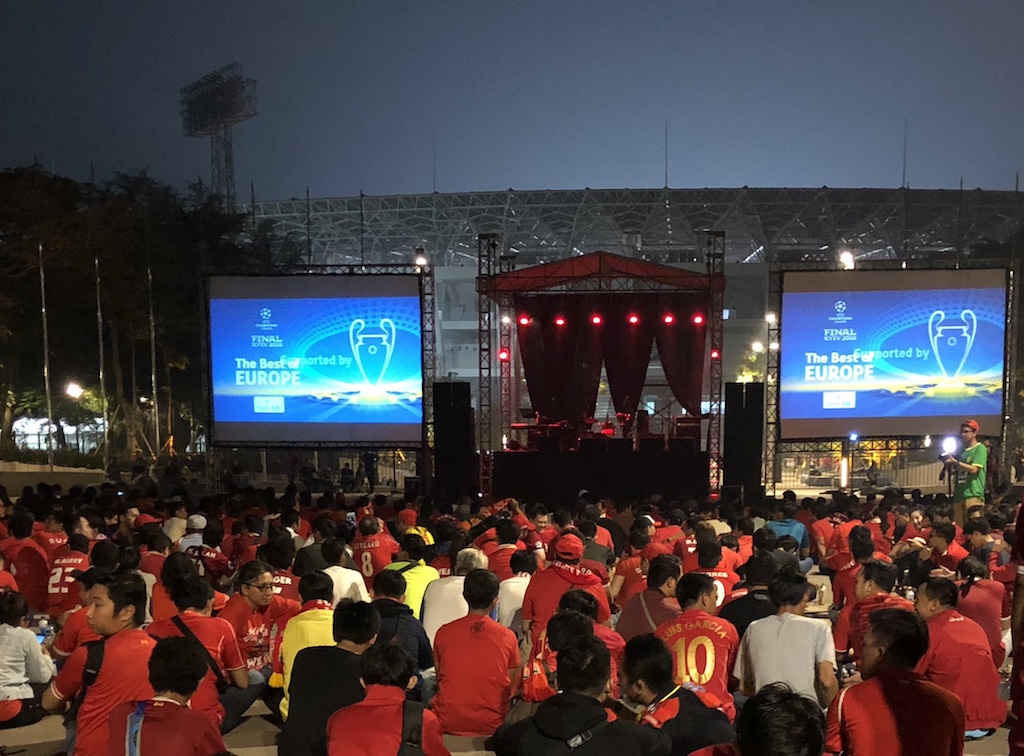
As the 1:45am (Jakarta time) kickoff neared, thousands had already filled GBK’s west lawn. Two giant screens stood against the backdrop of the majestic, flying saucer-like GBK stadium, further beautified by its night lights. The event is what is known in Indonesian as a nobar (a portmanteau of the words nonton, which means to watch, and bareng, which means together) hosted by BIG Reds.
Aditya Mahendra, BIG Reds commercial and communications VP, said they sold more than 3,000 tickets for this particular nobar screening, with a general admissions ticket costing IDR70K (US$5). The screening at GBK was just one of many hosted by BIG Reds throughout the country by their equally fanatical regional chapters, but this one, being in the capital city, was naturally one of the biggest.
One fan, a 33-year-old man named Anton, came alone to the screening. He told me he’s from Yogyakarta and that he rarely misses BIG Reds community events in his hometown. Since he’s in Jakarta on the day of the final, he said he had to be around fellow fans to experience the special occasion.
“I started liking Liverpool in middle school. I didn’t use to watch their games much, but then I got to playing soccer games on the Playstation and I got hooked. I then joined the community and here I am,” he said.
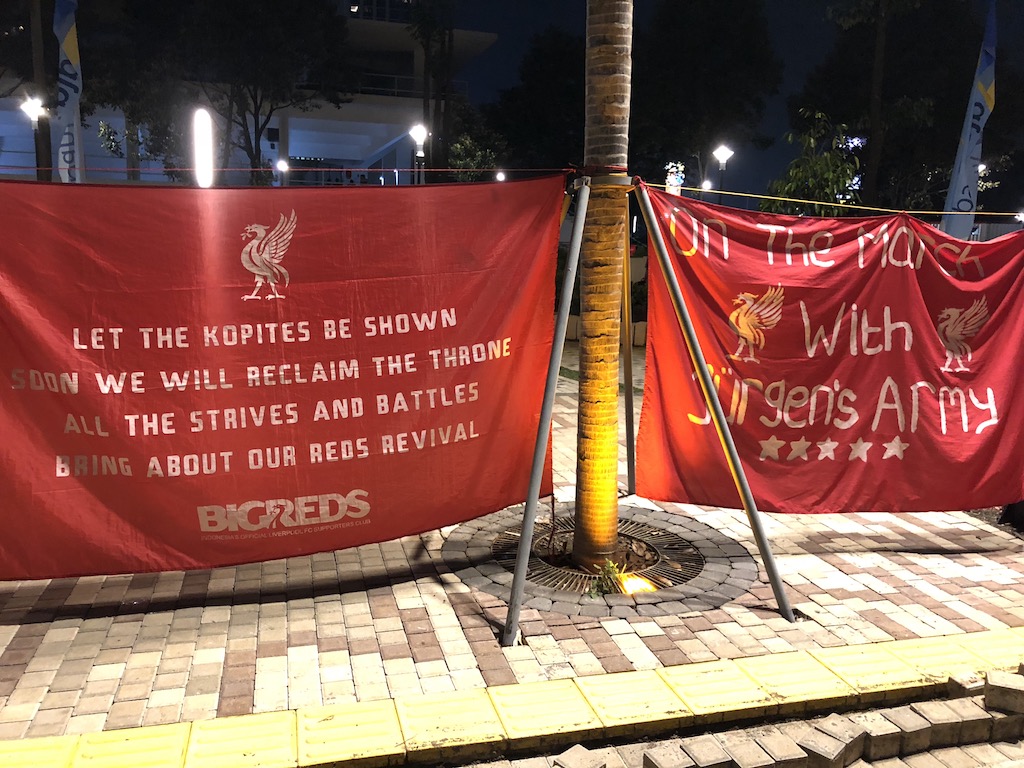
Liverpool’s James Milner kicked things off in Kiev — it’s already the next day in Jakarta. It was interesting to see the nervous expressions of those around me at GBK mirroring those of the Liverpool fans on screen who were mere yards away from the players at the NSC Olimpiyskiy Stadium. But the nerves temporarily dissipated as Liverpool began taking control of the game, Real Madrid seemingly content to feel out their opponents in defense.
That is, until that fateful moment in the 26th minute. The game turner.
Real Madrid’s notorious bad boy Sergio Ramos tussled for the ball with Mohamed Salah — undoubtedly Liverpool’s best player this season. In their struggle, Ramos, grabbing Salah by the arm, wrestled the Egyptian down to the ground judo style. Salah, in tears, was unable to continue due to a dislocated shoulder, while Ramos wasn’t even booked for the challenge.
“Fuck you, Ramos!” the fans at GBK screamed every time the Real Madrid captain appeared on screen. Loud jeers echoed each time he touched the ball.
Without Salah, there was no one to carry Liverpool’s attack, and their overall play suffered. A drab goalless first half ended; the GBK crowd was still somewhat hopeful, but there were murmurs that they were expecting the worst — Real Madrid are, after all, a team that tends to grow into a game as it progresses.
True enough, Liverpool buckled under pressure soon after the restart. On the 51st minute, goalkeeper Loris Karius gifted Real striker Karim Benzema with an absolute howler leading to the first goal of the game. No one at GBK looked like they had an ounce of optimism that Liverpool could score an equalizer, especially without Salah.
But, in a rare attack by Liverpool four minutes later, Sadio Mane managed to sneak it in past Keylor Navas to bring the score to 1-1. A rapturous celebration ensued at GBK, fans jumping for joy and hugging those closest to them in delight. The chants were back again.
Unfortunately, that proved to be the high point for Liverpool that night. Real Madrid’s Gareth Bale soon restored their lead with an otherworldly bicycle kick, before scoring another to seal the match thanks to another Karius blunder.
There were tears at GBK after the final whistle, but many recognized that reaching the final of the Champions League was such an amazing feat in itself for this young team, one the fans did not think was possible at the start of the season. Even in defeat, the fans broke into a soaring rendition of Liverpool’s anthem, You’ll Never Walk Alone. The lyrics seemed particularly apt for the moment:
At the end of a storm
There’s a golden sky
And the sweet silver song of a lark
Walk on through the wind
Walk on through the rain
Though your dreams be tossed and blown
Walk on, walk on
With hope in your heart
And you’ll never walk alone
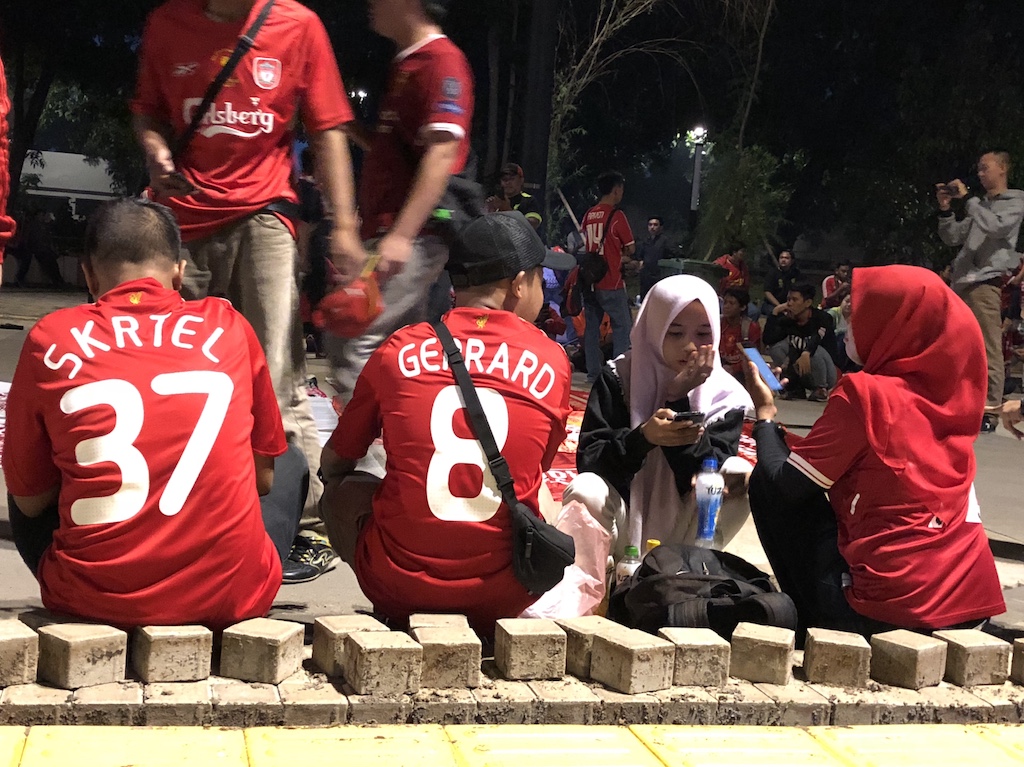
There’s absolutely no geographical obligation for fans like Evan, Ghufron, and Anton to support a team that’s located in a country they’ve never visited. They might even face language and cultural barriers were they actually to go to Liverpool. Yet soccer is a global sport, and increasingly so, with fan cubs and screenings of matches like these are common throughout the world.
Liverpool’s Indonesia fans are no bandwagoners, either — at least not the true fanatics we met on Saturday night. Distance be damned, loyalty means something to them (and by extension, their children, and their children’s children). It’s why Liverpool recognizes the huge market potential of Indonesia, and why Jakarta was one of the stops for the team’s pre-season summer tour in 2013 and possibly more in the future.
“Liverpool is a club with values and passion exceeding those of other soccer clubs. The club’s history, achievements, and fan passion in the form of chants and banners makes Liverpool a club with character that stands out from the rest,” said Aditya Mahendra, who himself has supported Liverpool since he was 11, back in the Michael Owen days.
“Passion is not always linked to achievement. I even see Indonesian fans who were born after the ’90s who support Liverpool because they personally feel they share the same values and the passion with the club.”
Will they book out the GBK for another final this time next year? It’s hard to see Liverpool reaching that point again, especially if this year is the anomaly experts would have us believe. But Indonesia’s Liverpool fans believe — they’ve never, ever lost hope, even after all these years — that their time in the sun will return. When it comes, Indonesia will be red.
